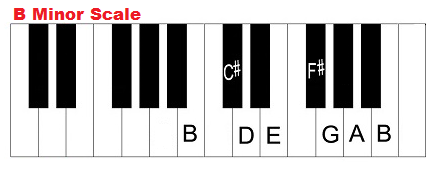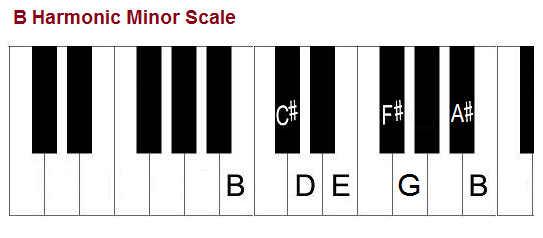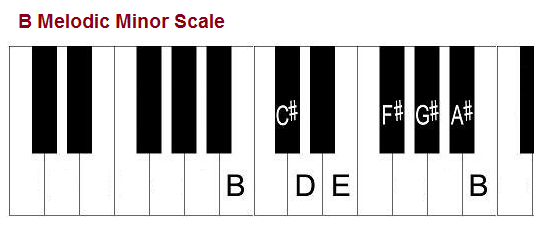This lesson is all about the B minor scale. We will take a look at the three types of minor scale, the natural minor, melodic minor and harmonic minor scales.
B Natural Minor Scale
Let’s start with the B natural minor scale. This scale consists of the pitches, B, C♯, D, E, F♯, G and A. It has two sharps.
To learn more about this scale and others, check out my course, Learn Scales & Music Theory & Give Yourself An Upper Hand.
Note Intervals of Bm Scale:
- Tonic: B is the 1st note of the B natural minor scale.
- Major 2nd: C# is the 2nd note of the scale.
- Minor 3rd: D is the 3rd note of the scale.
- Perfect 4th: E is the 4th note of the scale.
- Perfect 5th: F# is the 5th note of the scale.
- Minor 6th: G is the 6th note of the scale.
- Minor 7th: A is the 7th note of the scale.
- Perfect 8th: B (one octave higher) is the 8th note of the B natural minor scale.
Highly Recommended: Click here for the BEST piano/keyboard course I’ve come across online.
Here’s a diagram of the B minor scale (Bm scale) on the treble clef. 
Here’s the B minor scale on the bass clef.
Here’s the B minor scale on piano.
Scale Degrees:
- Tonic: B
- Supertonic: C#
- Mediant: D
- Subdominant: E
- Dominant: F#
- Submediant: G
- Subtonic: A
- Octave: B
The relative major of B minor is D major. Minor keys and their relative major make use of the same notes. The notes of the B minor scale as we’ve seen are B, C♯, D, E, F♯, G, and A. For the D major scale, it’s D, E, F♯, G, A, B and C♯. The difference is the root note of the two scales. The sixth note of a major scale becomes the root note of its relative minor.
You can memorize this formula to form any natural minor scale: whole step – half step – whole step – whole step – half step – whole step – whole step or w – h – w – w – h – w – w. (A whole step skips a key while a half step moves to the next key.) Let’s try this with the B minor scale. Let’s start on B and move a whole step to C#. From C# move a half step to D. Next, we move a whole step from D to E. From E, let’s move a whole step to F#. Next, we go up a half step from F# to G. From G, we move up one whole step to A. Finally, we move a whole step from A to B.
What are the fingerings for the B minor scale? They are as follows:
- Notes: B, C#, D, E, F#, G, A, B
- Fingerings (Left Hand): 4, 3, 2, 1, 4, 3, 2, 1
- Fingerings (Right Hand): 1, 2, 3, 1, 2, 3, 4, 5
Thumb: 1, index finger: 2, middle finger: 3, ring finger: 4 and pinky finger: 5.
Let’s now take a look at the chords in the key of B minor.
- Chord i: B minor. Its notes are B – D – F#.
- Chord ii: C# diminished. Its notes are C# – E – G.
- Chord III: D major. Its notes are D – F# – A.
- Chord iv: E minor. Its notes are E – G – B.
- Chord v: F# minor. Its notes are F# – A – C#.
- Chord VI: G major. Its notes are G – B – D.
- Chord VII: A major. Its notes are A – C# – E.
Chords in the key of B minor. All about the key of Bm and its chords.
B Harmonic Minor Scale
Let’s now take a look at the B harmonic minor scale.
The harmonic minor scale raises the seventh note of the natural minor scale by a half-step, when ascending and descending the scale. For example, the notes of the B natural minor scale are B – C♯ – D – E – F♯ – G – A – B. For the B harmonic minor scale, the notes are B – C♯ – D – E – F♯ – G – A# – B. The seventh note of the scale has been changed from A to A#. It’s now a half step (or semitone) higher.
The formula for forming a harmonic minor scale is W-H-W-W-H-W 1/2-H.
Harmonic Minor Scale Intervals:
- Tonic: The 1st note of the B harmonic minor scale is B.
- Major 2nd: The 2nd note of the scale is C#.
- Minor 3rd: The 3rd note of the scale is D.
- Perfect 4th: The 4th note of the scale is E.
- 5. Perfect 5th: The 5th note of the scale is F#.
- 6. Minor 6th: The 6th note of the scale is G.
- 7. Major 7th: The 7th note of the scale is A#.
- 8. Perfect 8th: The 8th note of the scale is B.
B harmonic minor scale on piano.
Here’s the B harmonic minor scale on the treble clef.
Here’s the B harmonic minor scale on the bass clef.
B Melodic Minor Scale
Let’s now take a look at the melodic minor scale. For this scale, you raise the sixth and seventh notes by a half step as you go up the scale and then return to the natural minor as you go down the scale. The notes of the B melodic minor scale ascending are: B – C♯ – D – E – F♯ – G# – A# – B. The notes of the B melodic minor scale descending are: B – C♯ – D – E – F♯ – G – A – B.
The formula for a melodic minor scale is W-H-W-W-W-W-H. The descending formula is the natural minor scale formula backwards.
Melodic B Minor Scale Intervals
- Tonic: The 1st note of the B melodic minor scale is B.
- Major 2nd: The 2nd note of the scale is C#.
- Minor 3rd: The 3rd is D.
- Perfect 4th: The 4th note is E.
- Perfect 5th: The 5th note is F#.
- Major 6th: The 6th is G#.
- Major 7th: The 7th is A#.
- Perfect 8th: The 8th note of the scale is B.
B Minor Scale (Melodic) on Piano:
Here’s the scale on the treble clef.
Here’s the scale on the bass clef.
Remember that for the melodic minor scale, when descending, you play the natural minor scale.
Building Piano Scales – All Types of Scales
Major and Minor Piano Music Scales in All Keys
Learn to Play Piano and Keyboard
Home Page: How to Play Piano and Keyboard